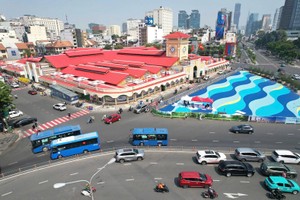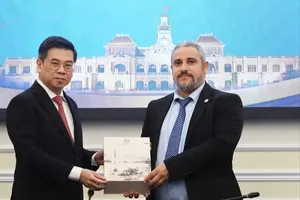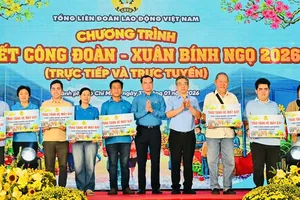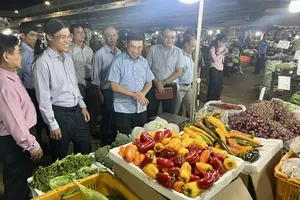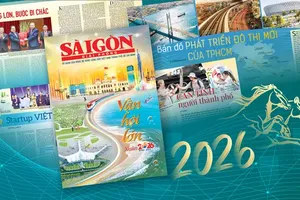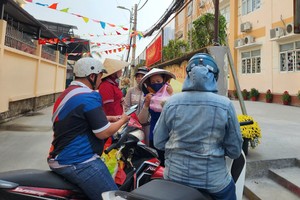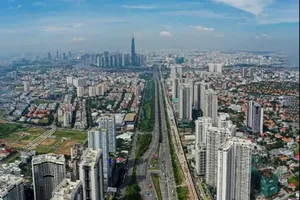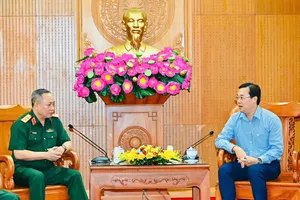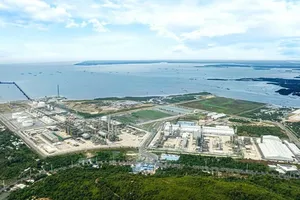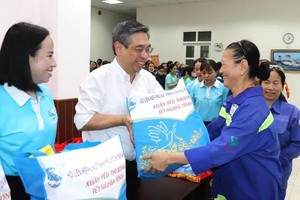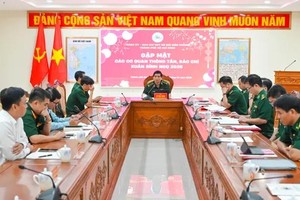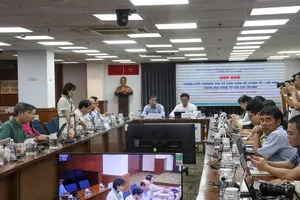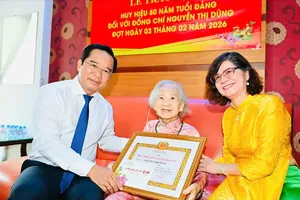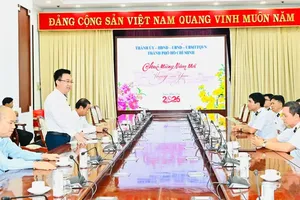)
On October 22, the Ho Chi Minh City Party Committee held a conference to review the implementation of Resolution 18-NQ/TW of the 12th Party Central Committee on continuing the reform and streamlining of the political system’s organizational structure for greater efficiency and effectiveness.
Attending the event were Secretary of the Ho Chi Minh City Party Committee Tran Luu Quang, Standing Vice Secretary of the Ho Chi Minh City Party Committee Le Quoc Phong, Chairman of the People’s Committee of the city Nguyen Van Duoc, Chairman of the municipal People’s Council Vo Van Minh, Vice Secretary of the Ho Chi Minh City Party Committee and Chairman of the Vietnam Fatherland Front Committee of the city Nguyen Phuoc Loc, and Vice Secretaries of the Ho Chi Minh City Party Committee Dang Minh Thong and Van Thi Bach Tuyet.
According to a report by the Ho Chi Minh City Party Committee, the city has proactively and resolutely implemented Resolution 18, closely adhering to the guidance of the Politburo, the Party Secretariat, and the Central Steering Committee. The restructuring of the political system's organizational apparatus has been carried out meticulously and prudently, in accordance with the Party’s principles, the Constitution, and the law, while also aligning with the city’s practical development needs.
Following the administrative merger, Ho Chi Minh City now spans more than 6,700 square kilometers, with a population of approximately 13.7 million people. It comprises 168 administrative units, including wards, communes, and special zone, positioning the city as a new megacity in the Southeast region.
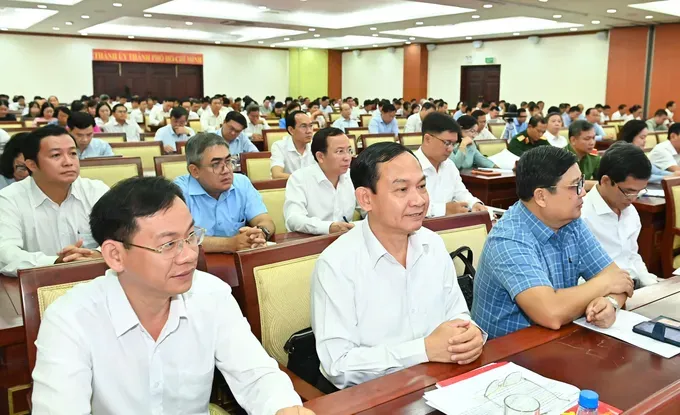
One of the most notable outcomes has been Ho Chi Minh City's successful restructuring of its two-tier local government system, reducing intermediary administrative layers and thereby enhancing the effectiveness and efficiency of state management.
Following the administrative consolidation, the Ho Chi Minh City Party Committee now oversees 173 subordinate Party organizations, including 168 Party committees at the ward, commune, and special zone levels, and five grassroots Party committees.
The city has dissolved 38 district-level Party committees and established four new ones under the direct authority of the municipal Party Committee, including the Party Committee of the Public Security Department, the Party Committee of the Military Command, the Party Committee of the People's Committee of Ho Chi Minh City, and the Party Committee of the City’s Party Agencies.
Currently, the Ho Chi Minh City People’s Committee has 15 specialized departments, along with the pilot Food Safety Department established under National Assembly Resolution 98, as well as 52 affiliated public non-business units.
The total number of officials, civil servants, and public employees across the city’s political system exceeds 7,350. This includes 583 officials working in advisory and assisting bodies under the Party Committee, 457 officials within the Vietnam Fatherland Front and mass political organizations, and more than 6,300 officials and civil servants across specialized departments under the municipal People’s Committee.
The Ho Chi Minh City Party Committee has also issued 15 decisions encompassing 31 categories and 740 job positions, ensuring alignment with the regulations set by the Party Central Committee’s Organization Commission and the city’s specific conditions.
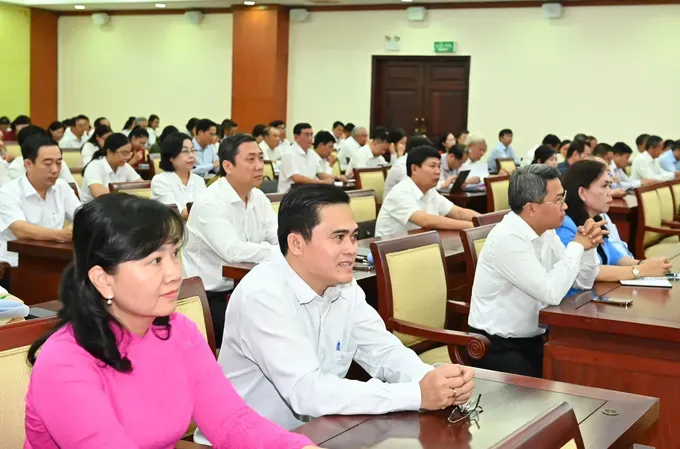
To date, the city’s digital infrastructure, from the municipal level down to wards, communes, and special zone, has been operating stably and seamlessly. Civil servants are now able to carry out administrative procedures more efficiently through designated accounts, while residents benefit from faster and more convenient online submission, progress tracking, and receipt of administrative results.
The Public Administrative Service Center has publicly configured a total of 2,298 administrative procedures, including 1,962 at the provincial level and 417 at the commune level. Among these, 339 are fully online public services, while 1,283 are partially online services.
The Ho Chi Minh City People’s Committee is continuing to implement its program to streamline and simplify administrative procedures related to business and production activities for 2025 and 2026. The city has instructed relevant departments and agencies to conduct comprehensive reviews and propose solutions aimed at reducing and simplifying procedures tied to business operations.
Each department and agency is required to propose measures to cut at least 30 percent of the time needed to complete procedures, 30 percent of the associated administrative costs, and eliminate at least 30 percent of unnecessary conditional business requirements, particularly in public investment. These efforts are expected to reduce business costs by at least 30 percent for individuals and enterprises operating in the city.
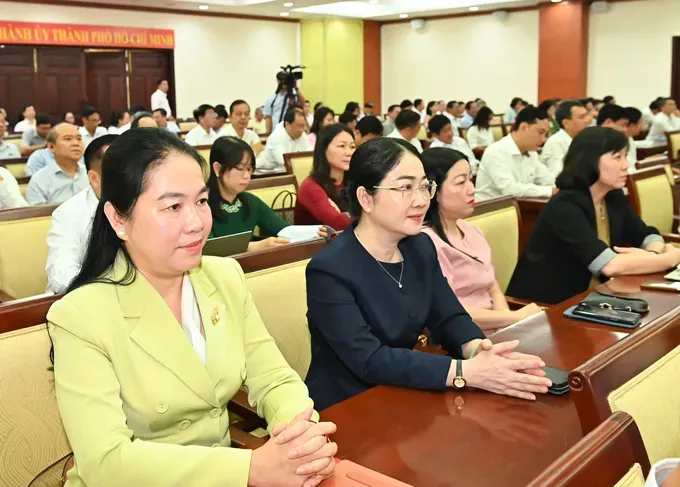
During the implementation process, Ho Chi Minh City has proposed that the central government issue clear guidelines on the number of deputy positions of agencies and organizations based on their respective management levels.
The city also recommends expanding administrative decentralization to the municipal People’s Committee, as well as to ward-, commune-, and special-zone-level authorities. This would enhance local autonomy, particularly in handling administrative procedures for citizens and businesses, aiming at reducing intermediary steps, shortening processing times, and creating a more streamlined, efficient service environment.
In addition, the city has called on ministries and agencies to coordinate closely with local authorities in proactively developing, providing, and refining data systems, online administrative procedures, and sector-specific operational software. These efforts aim to complete the foundational data infrastructure required for the two-tier digital government model. Ho Chi Minh City also urges the early launch of a shared foundational data system for “digital government,” integrated into the National Public Service Portal.

